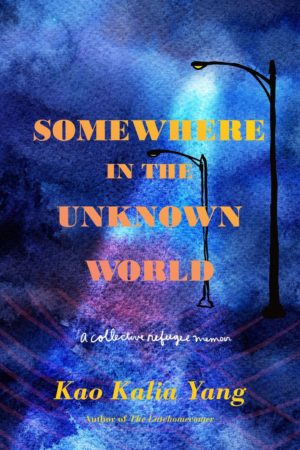Somewhere in the Unknown World
by Kao Kalia Yang
reviewed by Kevin O'Kelly
According to the United Nations, at least 26 million people in the world are refugees. That’s three times the population of New York City, denied the most basic of human rights: the right to simply be somewhere, knowing no one can make you leave. This number is an international disgrace, yet a relatively unknown one. Stories about refugees occasionally make the front pages of The Washington Post or The New York Times, but more often take a back seat to news about domestic politics, the stock market, or the latest travails of the middle class. Sometimes we see photos of groups of refugees, bodies crowded in camps in Greece, Sudan, or Jordan. But we seldom learn their names or hear their voices.
With the book Somewhere in the Unknown World: A Collective Refugee Memoir, Minnesota writer and activist Kao Kalia Yang, herself the daughter of refugees, has brought us their voices—voices telling stories of almost unimaginable resilience and an infinite capacity for hope, or at least endurance.
Like Yang herself, the people whose stories make up the collection all currently live in the Twin Cities area (Minnesota has a long tradition of welcoming refugees, strengthened in recent decades by organizations such as Arrive Ministries and the International Institute of Minnesota), where she met them and listened to them recount their experiences. In writing their stories, Yang didn’t adhere strictly to the conventions of oral history. She explains her method in the introduction: “I listened to each of the people represented here, and processed their stories slowly [ … ]. I then wrote each chapter, weaving in research to fill in the areas of the world I’ve never been to, and then sent it on to the interviewee with a direct question, ‘Is the story accurate?’” Although each chapter is written by Yang herself, the individual voices are distinct.
The interviewees come from countries ranging from Bosnia to Laos, but their stories all have a common heartbreak at their core: at some point, they discovered they weren’t wanted in their homeland; that they were not safe in the place that defined them, the same place where they learned their first words and first felt loved. Yang writes their experiences with raw power and vivid beauty, illustrating the hardships they endured to escape to the US, and offering poignant glimpses of the lives they were forced to abandon.
An Iraqi woman, Hawra Alnabi, remembers how as a child she and her family lived in a Sudanese refugee camp on $80 a month, adding, “we saved parts of our food rations—flour, sugar and rice—for our family back in Iraq who we knew were starving.” Chue Moua remembers that in the Laotian village where she was born, her father “planted a huge orchard of citrus fruit for my brothers and sisters and me so that when he died, we’d always have a place to go and find the sweetness of life.”
After leaving their old lives behind, once in the US these refugees find that while they may be physically safe, other kinds of hardships have just begun. Yousef Tawalkana, the former coach of Syria’s national judo team, takes a warehouse job that ruins his back. Sanouthith Vongsay, who would have been a teacher in her native Laos, harvests cucumbers on weekdays to pay for basic necessities and takes a second job on weekends to afford her children’s school supplies. Others suffer in unseen ways, like Fong Lee, a former Hmong soldier, who can never forget the two orphan girls he left behind because there was no room for them in the small raft that brought his own family to safety.
But the most troubling—and unforgettable—piece in this collection is “Certificate of Humanity,” Afghanzada Achekzai’s account of his escape from certain death in Kandahar and eventual sanctuary in the US. His story illustrates, more than any other in this book, how utterly dehumanizing refugee processing systems are. At one point in his journey, Achekzai arrives in Sweden—a country the UN considers one of the friendliest to refugees—in winter, wearing nothing but jeans, shoes, and a T-shirt. After hours of questioning, Swedish authorities gave him a bus ticket to Stockholm, where he would be taken to a refugee holding center. He had to wait overnight at the bus stop without once being offered food, water, or a coat. He writes, “The colder I got, the more I thought. What are all these white people doing in my country talking about humanity when this is how they receive the lost human beings?” After his arrival at the refugee center, he sat for hours more, waiting for his name to be called, all the while thinking, “You cannot think of your hunger or the cold. You cannot.” Achekzai spent another three years in stateless limbo before receiving permission to enter the US.
The book concludes with a summary of the basic steps of refugee resettlement in the US and the perspectives of Americans who work to help refugees make a new life in this country. The realities are bleak: when a refugee arrives, they get a one-time grant of $1125, which a resettlement agency doles out to them in smaller amounts at its own discretion. For their first ninety days in the US, refugees get help from that agency to look for work, find housing, get health care, enroll in English classes, and register their children for school. After this period of assistance, they’re on their own in a strange country, impoverished and often traumatized. At least, with Yang’s illuminating Somewhere in the Unknown World, their new neighbors can learn about what they’ve been through, and what they’re going through now.
Published on June 18, 2021

